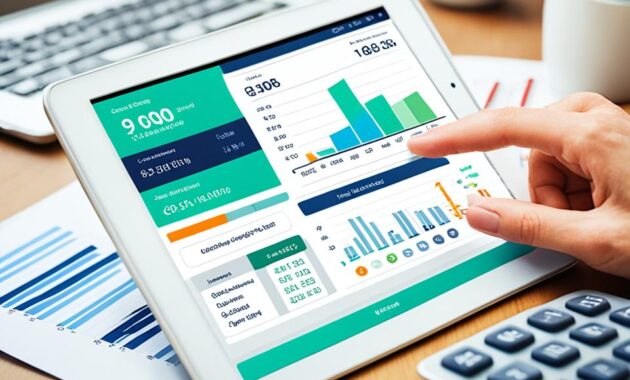In the present day monetary surroundings, securing an most beneficial personal mortgage is essential for reaching your financial objectives. Whether your intention is debt consolidation, protecting unforeseen charges, or locating a extra affordable borrowing option, low-hobby non-public loans stand out as pivotal. They provide huge financial savings and enhance your borrowing capacity. This guide delves into the area of low-interest non-public loans, highlighting their role in facilitating prudent borrowing and economic savings.
Key Takeaways
- Understand the benefits of low-interest personal loans, including reduced interest costs and more manageable monthly payments.
- Learn the credit score, income, and employment requirements to qualify for low-interest personal loans.
- Discover how low-interest personal loans can be used for debt consolidation, emergency financing, and other short-term needs.
- Explore the differences between online lenders and traditional banks when it comes to low-interest personal loans.
- Utilize online loan calculators to estimate the potential savings and monthly payments associated with low-interest personal loans.
Understanding Low-Interest Personal Loans
Low-interest personal loans are pivotal in the realm of personal finance. They offer borrowers a pathway to funds at competitive rates, serving as a more economical alternative to conventional credit options.
What Are Low-Interest Personal Loans?
These loans, unsecured in nature, feature interest rates significantly lower than those found on credit cards or other financing avenues. Their applications span a broad spectrum, from consolidating debts and enhancing homes to covering unforeseen expenses and immediate financial needs.
Benefits of Low-Interest Borrowing
- Reduced overall borrowing costs: The lower interest rates on low-interest personal loans can lead to substantial savings throughout the loan’s duration, positioning them as a financially advantageous choice for borrowers.
- Flexible repayment terms: Many providers of low-interest personal loans offer adaptable repayment schedules, enabling borrowers to align their loan with their financial circumstances.
- Improved credit profile: Timely repayment of a low-interest personal loan can enhance an individual’s credit score, potentially unlocking better financing prospects in the future.
- Versatile financing: These loans are versatile, suitable for a broad array of purposes, including debt consolidation, short-term financing, and unsecured loans for significant acquisitions or expenses.
“Low-interest personal loans can be a game-changer, providing borrowers with a more affordable and flexible financing solution.”
By comprehending the advantages of low-interest personal loans, individuals can make well-informed financial decisions. This knowledge empowers them to seek out options that facilitate cost savings and judicious borrowing.
How to Qualify for Low-Interest Personal Loans
Getting a low-interest personal loan requires you to meet certain eligibility criteria. This discussion will delve into the specifics of credit score requirements and the importance of analyzing income and employment during the loan application process.
Credit Score Requirements
Lenders primarily evaluate your credit score when assessing eligibility for a low-interest personal loan. A higher credit score generally correlates with more favorable interest rates. Applicants with a credit score of 700 or above are often preferred, as it reflects a history of responsible borrowing and timely repayment.
Income and Employment Verification
Aside from your credit score, lenders scrutinize your income and employment details. They aim to confirm you possess a stable income to support loan repayments. You will typically need to furnish documentation, such as pay stubs, tax returns, or employment contracts, to substantiate your income and employment status.
Debt-to-income ratio is another crucial factor, which compares your monthly debt obligations to your gross monthly income. A lower debt-to-income ratio enhances your attractiveness as a borrower for a low-interest personal loan.
| Eligibility Criteria | Typical Requirements |
|---|---|
| Credit Score | 700 or higher |
| Income Verification | Pay stubs, tax returns, employment contracts |
| Debt-to-Income Ratio | Lower is better |
By comprehending these pivotal factors, you can enhance your credit score, income, and financial profile. This strategic approach increases your likelihood of securing a beneficial low-interest personal loan.
Debt Consolidation with Low-Interest Personal Loans
Many individuals turn to low-interest personal loans for debt consolidation. This approach merges various debts into one, simplifying repayment and potentially reducing interest charges. It can also enhance your financial health.
Debt consolidation through a low-interest loan offers numerous advantages. It consolidates high-interest debts, like credit card balances, into a single, easier-to-manage payment. This strategy can significantly reduce interest costs over time, saving you money.
Moreover, such loans can improve your credit score. By organizing your debt payments and possibly decreasing your debt-to-income ratio, you may see a credit score boost. This can lead to better borrowing opportunities in the future.
“Consolidating my debts with a low-interest personal loan was a game-changer. It allowed me to take control of my finances and focus on a single, more manageable payment each month.”
Before opting for a low-interest personal loan for debt consolidation, assess your financial situation thoroughly. Ensure the loan’s interest rates and repayment terms surpass your current debts. This informed choice can simplify your finances and potentially save you money over time.
Emergency Financing: Low-Interest Personal Loans
When unforeseen expenses or short-term financial obligations arise, low-interest personal loans can serve as a flexible and economical solution. These loans act as a financial safety net for managing emergency loans and short-term financing needs, enabling you to handle unexpected expenses without overextending your budget.
Addressing Urgent Financial Needs
Life’s unpredictability often leads to unforeseen costs that can destabilize our financial well-being. Whether it’s an unexpected medical expense, a critical home repair, or an unforeseen car issue, low-interest personal loans can offer a timely solution. They provide the necessary funds, thus circumventing the high-interest pitfalls of credit cards or payday lenders, which can worsen financial strain.
Low-interest personal loans bring several benefits for emergency or short-term financial needs:
- Competitive interest rates that can save you money compared to other borrowing options
- Flexible repayment terms that fit your budget and timeline
- Faster approval and funding process to get the money you need quickly
- Potential for lower monthly payments, making it easier to manage your finances
By utilizing the advantages of low-interest personal loans, you can better manage life’s unexpected hurdles with enhanced financial confidence and stability.
“Low-interest personal loans provided me with the financial lifeline I needed when my car unexpectedly broke down. The quick approval and manageable repayment terms allowed me to get back on the road without draining my savings.”
– Sarah, Recent Low-Interest Personal Loan Borrower
Comparing Interest Rates and Repayment Terms
When delving into low-interest personal loans, it’s essential to meticulously compare the interest rates and repayment terms across different lenders. This comparison aids in identifying the most suitable option for your financial requirements and budget.
Online Lenders vs. Traditional Banks
Online lenders and traditional banks exhibit distinct approaches to personal loan interest rates and repayment terms. Online lenders, leveraging their efficient digital application processes, generally offer more competitive interest rates than traditional banks. This makes them a compelling choice for borrowers aiming to reduce their borrowing expenses.
Conversely, traditional banks may provide more adaptable repayment terms, enabling borrowers to tailor the loan duration to their financial circumstances. This flexibility is particularly advantageous for those desiring longer repayment periods or lower monthly installments.
| Factors | Online Lenders | Traditional Banks |
|---|---|---|
| Interest Rates | Generally lower | Tend to be higher |
| Repayment Terms | Relatively more standardized | More flexible and customizable |
| Application Process | Streamlined and digital | May involve more in-person interaction |
| Eligibility Criteria | May be more lenient | May have stricter requirements |
By evaluating the advantages and disadvantages of both online lenders and traditional banks, you can make a well-informed decision that matches your financial objectives and preferences. The best choice may differ based on your unique situation and the specifics of the loan options available.
Low-Interest Personal Loans: Save Money, Borrow Smart
When delving into the realm of borrowing, the aim should be to uncover a solution that fulfills your financial requirements while also ensuring cost savings. Low-interest personal loans stand out as a prudent and economical borrowing avenue, enabling you to save money while borrowing smart.
Low-interest personal loans are distinguished by their potential to diminish the total borrowing cost. By opting for a loan with a reduced interest rate, you can notably decrease the total sum you’ll repay, thus liberating more of your income for other financial endeavors. This is particularly beneficial for those aiming to consolidate high-interest debts or cover unforeseen expenses.
- Low-interest personal loans can help you save money on interest charges compared to other financing options.
- With a lower interest rate, you’ll have more manageable monthly payments, making it easier to stay on top of your repayment schedule.
- The cost savings from a low-interest personal loan can be redirected towards building your savings or achieving other financial goals.
When delving into low-interest personal loans, it’s crucial to evaluate your credit profile, income, and repayment terms to ascertain eligibility for the most advantageous rates. Through diligent research and comparison across various lenders, you can pinpoint a loan that suits your financial situation and propels you towards your savings targets.
“With a low-interest personal loan, I was able to consolidate my debts and lower my monthly payments, saving me hundreds of dollars in interest over the life of the loan.”
It is paramount to adopt responsible borrowing and adhere to timely repayment to fully leverage the advantages of low-interest personal loans. By embracing this astute financing strategy, you can effectively manage your finances and confidently pursue your financial aspirations.
Impact of Low-Interest Personal Loans on Credit Score
Securing a low-interest personal loan can profoundly influence your credit score. It is essential to comprehend how diligent borrowing and timely repayment impact your financial health. This knowledge is vital for sustaining a robust credit profile.
Responsible Borrowing and Repayment
Upon applying for a low-interest personal loan, a hard credit check ensues, potentially lowering your credit score temporarily. Yet, consistent, punctual payments can enhance your credit score over time. Such responsible borrowing and repayment habits signal to lenders your adeptness in debt management.
To positively influence your credit score, it is imperative to:
- Only borrow amounts you can afford to repay
- Ensure all payments are made on time and in full
- Avoid late or missed payments, which can severely harm your credit
- Keep a prudent credit utilization ratio (the credit you use versus your total available credit)
Adhering to these guidelines enables you to utilize a low-interest personal loan to enhance your credit score, responsible borrowing, and repayment history.
“Responsible borrowing and timely repayment are the keys to maximizing the positive impact of a low-interest personal loan on your credit score.”
| Impact on Credit Score | Responsible Borrowing | Irresponsible Borrowing |
|---|---|---|
| Short-term | Potential temporary dip due to hard credit check | Significant drop due to missed payments or high utilization |
| Long-term | Improved score through on-time payments and healthy credit utilization | Damaged score from late payments, defaults, or high debt-to-income ratio |
Unsecured vs. Secured Low-Interest Personal Loans
Exploring low-interest personal loan options often reveals the distinction between unsecured and secured loans. Unsecured loans hinge solely on your creditworthiness, whereas secured loans necessitate collateral, such as a vehicle or residence, to secure the loan. Grasping the nuances between these loan types aids in pinpointing the most suitable option for your financial circumstances.
Unsecured Loans: Flexibility and Convenience
Unsecured low-interest personal loans are favored by those seeking a flexible and convenient financial solution. They do not demand collateral, making them ideal for individuals lacking substantial assets for security. Although these loans generally carry a higher interest rate than their secured counterparts, they are often easier to obtain, particularly for those with commendable credit histories.
Secured Loans: Lower Rates, Higher Borrowing Limits
Conversely, secured low-interest personal loans offer the advantage of lower interest rates and potentially elevated borrowing limits. By leveraging an asset such as a vehicle or a residence as collateral, lenders perceive a diminished risk, which can lead to more advantageous loan terms. Nevertheless, this approach entails the risk of forfeiting your collateral if repayment is not made.
| Feature | Unsecured Loans | Secured Loans |
|---|---|---|
| Collateral Required | No | Yes |
| Interest Rates | Higher | Lower |
| Borrowing Limits | Lower | Higher |
| Qualification Criteria | Based on creditworthiness | Based on creditworthiness and collateral value |
The decision between unsecured and secured low-interest personal loans is contingent upon your financial standing, borrowing requirements, and collateral readiness. By comprehending the advantages and disadvantages of each option, you can make a well-informed choice that aligns with your financial objectives and secures the most favorable loan terms.
Online Loan Calculators: Estimate Your Savings

When contemplating a low-interest personal loan, grasping the influence of interest rates and monthly payments on your budget is paramount. Fortunately, online loan calculators offer a valuable tool to estimate potential savings and guide informed decisions.
Understanding Interest Rates and Monthly Payments
These calculators enable you to input variables such as loan amount, term length, and interest rate to estimate monthly payments. By comparing diverse loan options, you can pinpoint the one that aligns with your financial requirements and budget.
Moreover, these tools elucidate the long-term implications of interest rates on your loan’s total cost. By exploring various scenarios, you can make more astute choices and identify the low-interest personal loan that maximizes savings over the loan’s duration.
| Loan Amount | Interest Rate | Loan Term | Monthly Payment | Total Interest Paid |
|---|---|---|---|---|
| $20,000 | 6.5% | 3 years | $590 | $2,160 |
| $20,000 | 8.0% | 3 years | $615 | $2,740 |
| $20,000 | 5.0% | 3 years | $566 | $1,776 |
Employing online loan calculators facilitates a swift comparison of the effects of varying interest rates and loan terms on monthly payments and total cost. Such insights are crucial in your quest for the most advantageous low-interest personal loan.
The essence of borrowing wisely lies in comprehending the specifics of your loan, including interest rates and monthly payments. With online loan calculators at your disposal, you can make more informed decisions and secure the low-interest personal loan that suits your financial circumstances best.
Tips for Finding the Best Low-Interest Personal Loan
Securing a low-interest personal loan requires a strategic approach. Start by comparing rates and terms across various lenders, encompassing both online and traditional banks. This thorough comparison enables you to pinpoint the most competitive offers that suit your financial situation.
The loan application process can appear overwhelming, but strategic preparation can simplify it. Ensure you have all required documents ready, including proof of income, employment details, and identification. This preparation will expedite the application review process. Furthermore, focus on enhancing your credit score, as a better score can lead to lower interest rates.
Identifying the ideal low-interest personal loan involves more than just finding the lowest rate. It’s crucial to consider whether the loan fits within your repayment capacity. Delve into the loan terms, including repayment duration and any additional fees, to ensure the loan aligns with your financial goals. This meticulous evaluation will help you make an informed decision, paving the way for long-term financial stability.







